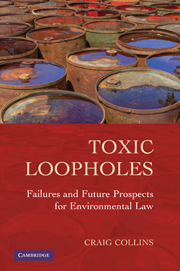Book contents
- Frontmatter
- Contents
- Dedication
- Introduction: Crime Without Punishment
- 1 The EPA – Policing or Protecting Polluters?
- 2 The Clean Air Act – Gasping for Breath
- 3 The Clean Water Act – Up Sh*t Creek
- 4 Superfund and RCRA – Toxic Trash
- 5 TSCA – The Toothless Tiger
- 6 The Endangered Species Act – Noah's Ark or Titanic?
- 7 Planetary Problems – Cooperation or Collapse?
- Conclusion: A Glimmer of Hope
- Bibliography
- Index
Conclusion: A Glimmer of Hope
Published online by Cambridge University Press: 05 June 2012
- Frontmatter
- Contents
- Dedication
- Introduction: Crime Without Punishment
- 1 The EPA – Policing or Protecting Polluters?
- 2 The Clean Air Act – Gasping for Breath
- 3 The Clean Water Act – Up Sh*t Creek
- 4 Superfund and RCRA – Toxic Trash
- 5 TSCA – The Toothless Tiger
- 6 The Endangered Species Act – Noah's Ark or Titanic?
- 7 Planetary Problems – Cooperation or Collapse?
- Conclusion: A Glimmer of Hope
- Bibliography
- Index
Summary
Without environmental laws, the quality of our air, land and water would be frightening to imagine. This does not alter the fact that the Environmental Protection Agency (EPA) has never lived up to its name. Instead, its performance has ranged from feckless and feeble to crooked and criminal. Forty years after Congress enacted tough- talking ecological edicts and the president authorized the EPA to enforce them, nature remains in critical condition. Our environmental laws are riddled with loopholes, exceptions and exclusions, and the pollution police scarcely bother to enforce them. Worse yet, the established approach to environmental protection is fundamentally flawed and ineffectual because it relies on control and cleanup, rather than precaution and prevention.
Powerful forces, emanating from the very nature of our political economy, confound the basic intent of the law and undermine the entire environmental protection process. Even under the most ecologically inclined administrations, the EPA functions within a capitalist milieu where profit-driven polluters externalize their ecological costs whenever possible, while their political accomplices (in both parties) enact toothless laws and appoint ineffective enforcers. The EPA's regulatory efforts are completely incapable of avoiding an escalating ecological calamity. The established approach to environmental protection resembles paddling against the current in a leaky rowboat with a treacherous waterfall behind us.
Since the legal and institutional failures of the prevailing system stem from dysfunctions in the surrounding political economy, it is no accident that the EPA's pathetic record as a regulatory agency is hardly unique.
- Type
- Chapter
- Information
- Toxic LoopholesFailures and Future Prospects for Environmental Law, pp. 233 - 240Publisher: Cambridge University PressPrint publication year: 2010



